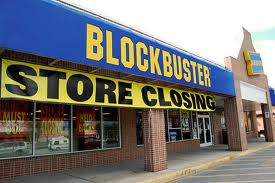Out with the old and in with the new once more. Last month it was Blockbusters, the global giant of video rentals, closing their last few doors for the last time in the USA, as they filed for bankruptcy. Technology has overtaken them, their model of offering films for rent is obsolete.
Even in the UK where I grew up there seemed to be one on every corner. I used to walk round of an evening and thumb through the Betamax section (my mum had Betamax, much better quality than VHS, not widely used in a domestic setting but still used today for broadcasting).
For youngsters reading this article, the idea was that you take the film home and watch it and then return it the day after. Yes I know it sounds ridiculous, but if you forgot to return it you paid overdue fees, and these alone made $800 million in the year 2000, and that was less than 20% of the company’s operating profits!
And the rise was incredibly fast. In its first 15 years of operation Blockbuster grew from nothing to more than 9000 stores, even today it still boasts 3000, although they have been losing money hand over fist for more than a decade.
Netflix put an end to the party, but how could such a giant in the entertainment industry miss out on an opportunity to move forward. Back in 2002 they could have bought the Netflix operation for next to nothing, but the then CEO never thought it would take off. How wrong could he be?
Well here in Cambridge Massachusetts they have devised a system in order to try and stay on track with such developments, although I am not sure it is a good one. There is a huge culture of start-up funding, with an entire industry revolving around funding such new ventures.
We have the Mass Challenge competition that gives away more than a million dollars a year, loads of networking meetings and funding workshops. But what are these investors looking for? They are looking for the next Netflix or Amazon obviously, and they are prepared to put large sums of money into anything that looks like it might develop into something of the sort.
There are a lot of start-ups here that manage to spend a million a year for several years without ever turning a profit. A few hundred thousand on lawyers each year, nice office space, public presentations, and the investors keep coming in looking to make a fortune on the next new thing.
Just to give an idea of how much money is invested if we take a look at Mass Challenge they have invested $472 million in the last 4 years, and that has made a return income of $194 million. This investment has created 3928 jobs although we don’t know how many of them exist today.
All well intentioned I am sure but that means they have so far lost $278 million in 4 years. But they have created jobs, although at a cost of almost $71000 each. Not a great return, but we are talking about a not for profit organization investing private money so presumably everyone is happy.
I just wonder whether a more efficient model could be found, while not missing out on the next best thing of course. And I wonder how ethical investment choices are made. We are dealing with huge resources, and resources are the key to shaping the development of society. How much of this money could be said to be invested for the good of society? And how long can this type of approach continue whan 3 out of 4 fail?
I should just add that I use Zipcar, a local car sharing start up, so I don’t want to sound too critical. They have taken many cars off the road, which can only be a good thing. Several other food start ups work for social good, but they feel cut out of the funding cycle. See this post I wrote for IX about their positions.






